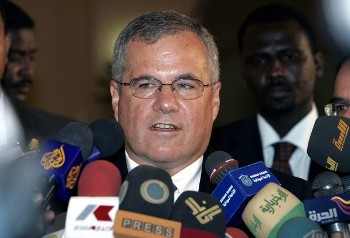US says relations improving with Sudan
July 19, 2009 (KHARTOUM) — The US special envoy to Sudan Scott Gration said that progress has been made in bilateral relations with Khartoum.

Sudan wants full normalization of ties including upgrading diplomatic relations, lifting of economic sanctions imposed since 1997 and being removed from the list of countries that sponsor terrorism.
US officials who visited Sudan since President Obama took office appeared to suggest that these demands are on the table depending on improvement with regard to the Darfur crisis and the North-South peace agreement.
Al-Deen said that his discussions with Gration tackled obstacles that hinder the improvement of relations between the two countries.
He revealed that he protested the recent labeling of Darfur conflict by Obama as genocide saying that these statements “do not help bilateral relations or Darfur crisis”.
Gration on his end described the talks he held so far as “constructive”.
The meeting also included the Sudan People Liberation Movement (SPLM) as part of the tripartite commission to review outstanding issues in the Comprehensive Peace Agreement (CPA).
Last week the head of the SPLM delegation Malik Agar said that the talks made little progress in resolving a string of other disputes, including preparations for national elections, a disputed census and a raft of laws seen as central to the peace deal.
Gration is due to fly to Abyei on Tuesday, a day before the Permanent Court of Arbitration (PCA) at The Hague will make its ruling on the borders of the region.
(ST)

Ambago
US says relations improving with Sudan
Washington plans no normalization with Khartoum before settling Darfur and South Sudan.
It was in June 1989 that the current Islamists took power in Khartoum in a bloodless military coup. Since then the new Sudanese regime declared enmity with the West and specially the US. There had been a lot of confrontations between the Clinton administration at that time and the Khartoum Junta.
Sudan was then rightly labeled by the West as a terrorism sponsoring state when it made its soil a safe haven for all the anti West forces ranging from al Qaeda with its leader Osama bin Laden all the way to include the most radical Islamists from Tunisia, Egypt, Morocco, Palestine, Jordan, Malaysia, Indonesia, Chechnya…..name it.
It was a whole decade of war of words between Washington and Khartoum. The Sudanese national TV was almost turned into a Friday’s mouth piece for radical anti West Islamism.
Not a moment passed by in Khartoum without anti US songs or rhetoric being aired over the Omdurman radio.
These were obviously followed by severing of relationship between Khartoum and Washington. But following 9/11, the Khartoum regime was quick to change positions and its cooperated extensively with the US in the war against terror in a bid to save its own tail from the US wrath.
Now the Sudanese government official, the prominent al Qaeda sympathizer Dr. Ghazi Salah al Din wants the Obama administration to do the following as a reward for the regime’s cooperation with the US in the war against terrorism as it offered much valuable intelligence information on al Qaeda and its leadership:
1. Full normalization of ties including upgrading diplomatic relations,
2. Lifting of economic sanctions imposed since 1997 and being
3. Removal of Sudan from the list of countries that sponsor terrorism.
Unfortunately, according to all the successive US delegations and envoys to Khartoum, the Sudanese demands are on the table to be looked into BUT awaiting improvements on:
1. the Darfur crisis
2. The North-South peace agreement.
For somebody like me, I just conclude that the current US administration is using the UNSC position on the ICC warrant against al Bashir and the soft approaches of Gration to arrive with the Sudanese authorities to a final and lasting solutions to the Darfur Crisis and the North – South peace agreement at the end of which the southerners shall have to choose to go their way or remain in a united Sudan.
Until that time Khartoum may continue to press on Washington for the normalization of relationships, but in practical terms it will be Khartoum to show the political will and act in good faith before it can get any tangible rewards from the Americans.
By: Dr. Justin Ambago Ramba, MD. United Kingdom.